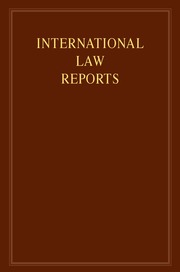Article contents
Republic of Ghana v. High Court (Commercial Division) Accra, ex parte Attorney-General (NML Capital Ltd and Republic of Argentina, interested parties)
Published online by Cambridge University Press: 01 January 2021
Abstract
Relationship of international law and municipal law — Treaties — Effect — United Nations Convention on the Law of the Sea, 1982 (“UNCLOS”) — International Tribunal for the Law of the Sea established by UNCLOS — Orders of Tribunal — Whether Ghanaian courts obliged to enforce orders of Tribunal — Doctrine of incorporation — Article 75 of Ghanaian Constitution 1992 — Whether incorporating UNCLOS into Ghanaian law — Ghana’s international obligations under UNCLOS — Means of remedying any breaches — Whether orders of Tribunal valid basis for grant of certiorari
State immunity — Jurisdictional immunity — Warships — Commercial transactions — Enforcement of foreign judgments — Interpretation of waiver clause in contract — Foreign judgment finding that Argentina had contractually waived its sovereign immunity — Whether Ghanaian courts obliged to enforce foreign judgment — State’s sovereign right to waive contractually its sovereign immunity — Ghanaian court ordering seizure of Argentinian warship — Military nature of asset of foreign sovereign — Significance — Whether foreign warship immune from detention — Public policy considerations — Peace and security of Ghana — Clarification of common law of Ghana — Whether order of Ghanaian court to attach military vessel fundamentally erroneous decision — Whether valid basis for grant of certiorari — The law of Ghana
- Type
- Case Report
- Information
- Copyright
- © Cambridge University Press 2014
- 1
- Cited by




